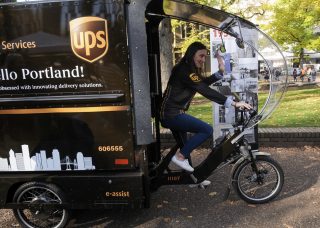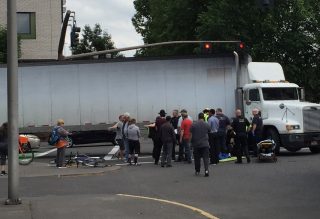
(Photo: J. Maus/BikePortland)
The Portland Bureau of Transportation has launched an update to the Freight Master Plan and the first place they stopped to ask for feedback was the bicycle advisory committee.
That makes sense given the tragic legacy of death and injury left behind by drivers of big trucks on Portland’s central city streets.
For years we’ve failed to mitigate the immense risks posed by trucks. With a massive boom in e-commerce and new ideas around how we use streets and curb space, the freight plan just might be a perfect opportunity to finally make progress.
PBOT planner Stephanie Lonsdale and freight coordinator Bob Hillier laid out the context of the issue at the meeting last night.
Advertisement
Lonsdale equated our current handling of deliveries to, “A transit system where you didn’t plan for the bus stops.” She described a “paradoxical tension between freight and livability”. “The factors that make a community livable — like more bicycle and pedestrian infrastructure, increased density and mixed uses — increase freight demand while reducing freight access,” she said.
In 2019 PBOT commissioned a study (PDF) into how e-commerce and technology were impacting urban deliveries. The findings were striking:
— Between 2010 and 2017, U.S. e-commerce retail sales grew from $165 billion to $453 billion, a 175% increase.
— Between 2009 and 2017, the average number of monthly online deliveries per household more than doubled from 2.4 to 4.9.
— Between 2015 and 2017, Oregon on-line sales jumped by 50%.
— Over the past year alone PDX air cargo plane traffic grew by 12 commercial flights per day attributed to growth in e-commerce.
— Between 2000 and 2018, despite a 37% decrease long-haul truck mileage overall, vehicle miles traveled by commercial trucks increased 18% between 2011 and 2016, primarily due to significant growth in short-haul and last-mile truck trips.
Portland Freight Coordinator Bob Hillier said PBOT is looking into a host of strategies to improve urban delivery including different forms of pricing (more on that below), increased use of parcel lockers, off-peak hour delivery times, curb management technology like CurbFlow (a company that has already pitched its tool to PBOT), and incentives for emissions-free vehicle use.

If you’re waiting for Portland to regulate away big and dangerous trucks in favor of electric cargo trikes or smaller vehicles, you’ll have to keep on waiting. Hillier threw cold water on that idea when it came up discussions from committee members last night. He said it comes down to economics for the delivery company and he maintained that larger trucks are ultimately safer and more efficient.
“With larger trucks the driver is a professional and must have a CDL [commercial driver’s license], with smaller trucks they don’t,” Hiller said. “So you’ve got professional drivers on the road that understand the safety and they’re not out to run anybody over.” As for for using smaller vehicles, Hiller said since larger trucks can carry more (he cited 15,000-pound capacity of a FedEx van versus 800-pound capacity of a B-Line cargo trike), a large truck has “collectively less impact than multiple smaller trucks in terms of fuel use and wear-and-tear on the roadway.” Economically-speaking, Hiller pointed out that it’s simply cheaper for companies to pay one driver to haul 15,000 pounds than to pay that same driver to haul 800 pounds.
Advertisement
Committee member (and mayoral candidate) Sarah Iannarone spoke up to say the entire framing of the conversation was wrong.
“Why are we acting like consumer demand is going to drive all our decision-making when it comes to infrastructure? We should be using climate action, human rights, and equity and the front of our policy agenda,” she said. “My concern is about people living here and keeping them safe.”

(Photo: @SmplicityCycles via Twitter)
Iannarone added that in her view e-commerce and its free-and-fast delivery model people love is only possible because, “We’ve allowed [these companies] to use our infrastructure for free.”
With the huge spike in deliveries not just from usual suspects like UPS, Amazon and FedEx but the myriad smaller and local companies who’ve jumped on the direct-to-consumer trend, several committee members seemed to support a tax on delivery drivers and/or some sort of fee for companies that profit off the right-of-way. Committee member Clint Culpepper wondered if the city would explore something similar to the 50-cent surcharge PBOT collects each time someone pays for an Uber or Lyft ride.
Jamey Duhamel a policy advisor for Commissioner Chloe Eudaly who’s become a regular at bike advisory committee meetings, said her boss is already headed in that direction with the formation of the Pricing Options for Equitable Mobility Task Force. “Right now they are taking up the question of how we price the right-of-way, including parking fees, congestion pricing, even how to price right-of-way for these delivery platforms.”
There’s so much at stake with our urban delivery policy. We’ll be watching this plan update closely. Learn more about the 2040 Freight Plan at Portland.gov.
— Jonathan Maus: (503) 706-8804, @jonathan_maus on Twitter and jonathan@bikeportland.org
— Get our headlines delivered to your inbox.
— Support this independent community media outlet with a one-time contribution or monthly subscription.


